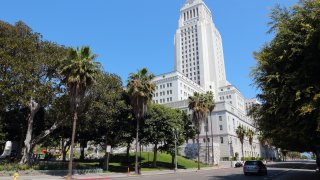
After relaxing parking restrictions during the COVID-19 pandemic, the City Council on Friday called for the full enforcement of vehicles stopped in peak hour lanes or "no-stopping zones."
In a 11-3 vote in favor of a motion introduced by members Kevin de León and Traci Park, seconded by John Lee, City Council instructed the Department of Transportation to tow away "any and all" vehicles violating "no-stopping zones" or parked in a peak hour travel lane.
Lee also introduced an amendment expanding the motion to resume the enforcement of established parking restrictions, which also garnered approval.
Councilwoman Heather Hutt was absent during the vote.
Get top local stories in Southern California delivered to you every morning. Sign up for NBC LA's News Headlines newsletter.
The item was approved forthwith meaning it will be fast tracked to Mayor Karen Bass' office for her signature. Though when the city will begin enforcing parking regulations to the fullest extent remains to be seen as the Los Angeles Police Department and Department of Transportation will need to update enforcement protocols, according to city officials.
Pete Brown, de León's communications director, said the councilman was pleased to see the motion pass and soon result in eliminating "dangerous and hazardous" parking that puts pedestrians, bicyclists and motorists at risk.
In April 2022, the City Council passed similar efforts to address unlawful parked vehicles, which focused on abandoned vehicles and those used as dwellings by unhoused individuals. The motion approved Friday aimed to clarify that "any" vehicles will be subject to towing and other parking regulations.
Local
Get Los Angeles's latest local news on crime, entertainment, weather, schools, COVID, cost of living and more. Here's your go-to source for today's LA news.
Lee described the move as a "good, common sense policy." He added, "It puts our city back to where we need it to be and hopefully meets the expectations of the residents of our city that we enforce the laws and rules that we already have on our books."
Lee's amendment was met with criticism from several council members, including Councilwoman Nithya Raman, citing concerns as to how the policy would impact efforts on addressing recreational vehicle homelessness in the city.
Raman noted how efforts developed by the City Administrative Officer Matt Szabo and a program established by Councilwoman Monica Rodriguez -- an RV buyback program implemented last year and some City Council members are looking to fund and expand citywide -- would be "moot." She called Lee's amendment as "overbroad."
"...We need to have a holistic strategy on addressing RV homelessness. We have talked about what those resources are, we have planned for what those resources and we are working on putting together that citywide strategy," Raman said.
She urged her colleagues to move forward in a "thoughtful way" that addresses traffic safety and the needs of people experiencing homelessness.
Raman requested that the amendment be sent back to the council's Transportation Committee for further consideration. Her motion to do so failed in an 8-6 vote.
Councilwoman Eunisses Hernandez, who supported Raman, questioned the DOT's enforcement capabilities given the financial challenges the city faces as well as limited garage space to store RVs.
"There are laws that are on the books, but do we even have capacity to enforce?," Hernandez said. "I just don't want us to be saying that we're going to do something, yet really put no resources or capacity to actually make it happen."
Council President Pro Tempore Marqueece Harris-Dawson raised concerns over the inequitable distribution of enforcement. He noted how in some cases there will be ticket after ticket issued while in other instances vehicles might get towed.
"I don't think that's fair to anybody involved in this process," Harris-Dawson added.
Rodriguez agreed with both Hernandez and Harris-Dawson, but ultimately supported Lee's amendment. She added, "We have a hit or miss enforcement tactic, and it runs afoul to the people who are being overburdened -- and they're the ones getting hit with tickets versus the ones that blatantly disobey the signage and will continue to park without any impact."



